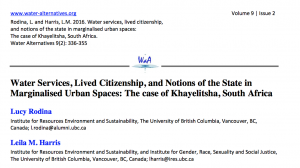Rodina, L & L. M. Harris (2016). Water Services, Lived Citizenship, and Notions of the State in Marginalised Urban Spaces: The case of Khayelitsha, South Africa. Water Alternatives 9(2): 336-355.
**Part of Special Issue: Water, infrastructure and political rule. Guest Editors: Christine Bichsel, Peter Mollinga, Timothy Moss, Julia Obertreis
Abstract: In this paper we argue that in South Africa the state is understood and narrated in multiple ways, notably differentiated by interactions with service provision infrastructure and the ongoing housing formalisation process. We trace various contested narratives of the state and of citizenship that emerge from interactions with urban water service infrastructures. In effect, the housing formalisation process rolls out through specific physical infrastructures, including, but not limited to, water services (pipes, taps, water meters). These infrastructures bring with them particular logics and expectations that contribute to a sense of enfranchisement and associated benefits to some residents, while others continue to experience inadequate services, and linked exclusions. More specifically, we learn that residents who have received newly built homes replacing shack dwellings in the process of formalisation more often narrate the state as legitimate, stemming from the government role as service provider. Somewhat surprisingly, these residents at times also suggest compliance with obligations and expectations for payment for water and responsible water consumption. In contrast, shack dwellers more often characterise the state as uncooperative and neglectful, accenting state failure to incorporate alternative views of what constitutes appropriate services. With an interest in political ecologies of the state and water services infrastructures, this paper traces the dynamic processes through which states and citizenship are mutually and relationally understood, and dynamically evolving. As such, the analysis offers insights for ongoing state-society negotiations in relation to changing infrastructure access in a transitioning democracy.
KEYWORDS: Informal settlements, water services, citizenship, access to water, South Africa
